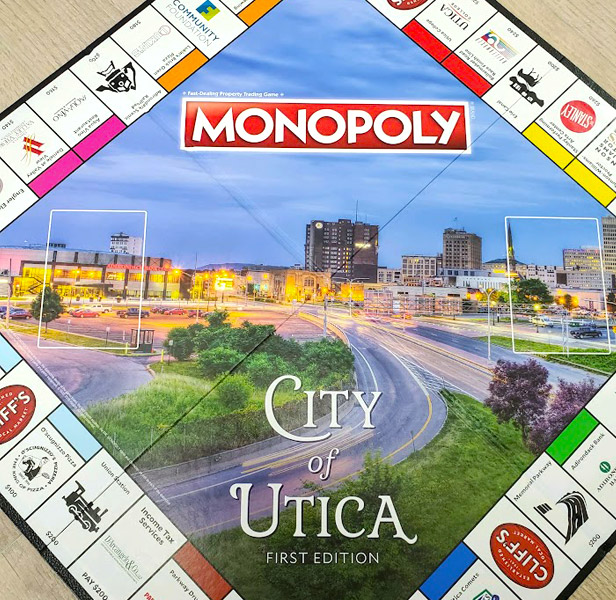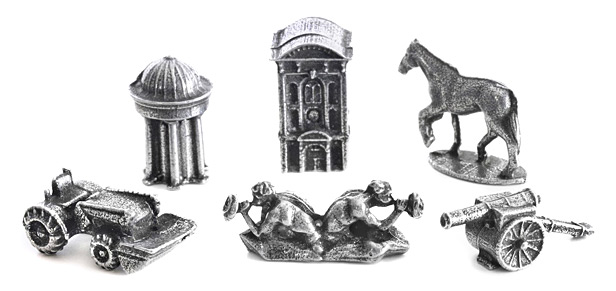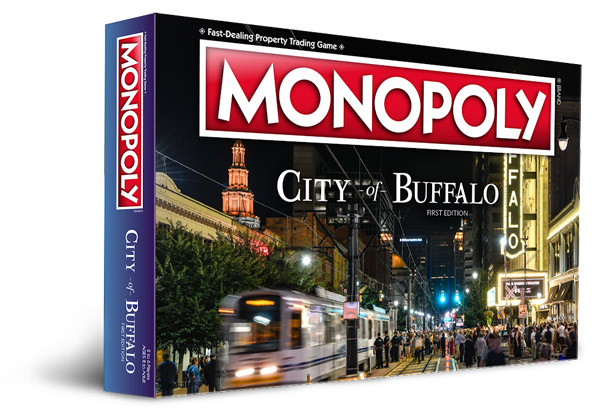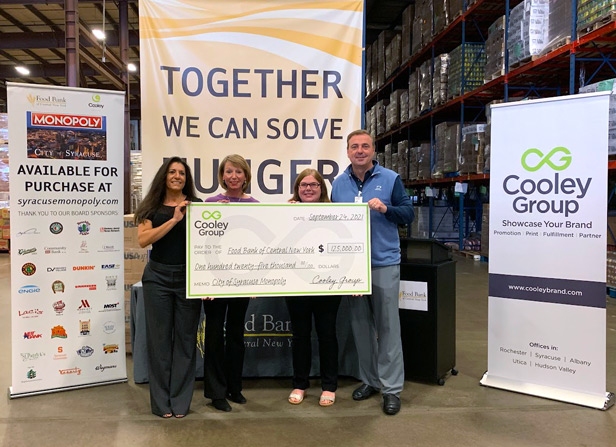Strategy November 19, 2021
Case Study: Turning MONOPOLY Money Into Real Donations
Cooley Group’s innovative custom MONOPOLY games – representing cities throughout New York state – raised substantial funds for worthy local nonprofits and organizations.

The Promo Pro: Jeana Nicotera, Brand Consultant
The Distributor: Cooley Group (asi/168125)
The Clients: Multiple community organizations in New York state
The Job: Create custom MONOPOLY games that represent specific cities, with sales of the games raising funds for local organizations like nonprofits and a children’s hospital.
The Impact: Through the creation and sale of more than 30,000 custom MONOPOLY games, more than $1 million has been raised to support beneficiary organizations.
STEP 1:
Never Give Up
Sometimes, the biggest successes are born from failure.
Just ask Jeana Nicotera.
The brand consultant for Cooley Group, a promotional products distributor with locations around New York state, took inspiration at a promo industry trade show and got the idea to create a custom MONOPOLY game for one of her clients, a union of correctional officers. The client loved the concept. Given legal licensing requirements, Hasbro, which holds the rights to the official MONOPOLY game, had to sign off. That didn’t happen.
Still, there was no quit in Nicotera. She felt she had a real winner with the concept. Eventually, she decided to propose the initiative as the primary driver of what would be a pivotal fundraiser for her client Abraham House, a social services organization in the Utica, NY, area that provides terminally ill people a safe and loving home at no cost.
This time around, things would go differently.
STEP 2:
Help the Client Understand the Vision
Nicotera’s planned campaign was not your typical promo concept. As such, it was going to take careful consultation and explanation to help the client understand what she had in mind. That’s just what Nicotera delivered to get Abraham House on board.
“Jeana didn’t set out to ‘sell’ a program,” says Cooley Group President Phil Yawman. “She communicated and explained her vision and how it could have a positive impact for both the client and the community. Once clients understand that vision, the ‘sale’ happens naturally. It becomes not a transaction, but partners working together toward a common goal.”

Cooley Group created this custom MONOPOLY game to represent the City of Utica, NY. Sales benefited Abraham House, a local social services organization.
The idea was this: Nicotera would create a custom MONOPOLY game that would represent the City of Utica. To be featured on the board, local businesses would have to pay a sponsorship fee. Those fees would pay for things like production, distribution and Cooley Group’s work on the project. The games would then be retailed in the community, with all of the money from those sales going to benefit Abraham House, which relies on local support to advance its noble mission.
“Our goal was to create a civic pride piece that would benefit an important community institution,” explains Nicotera.
STEP 3:
Handle the Many Moving Parts
Of course, the client being game was only the first important step. Nicotera still had a lot of legwork in front of her. Energized and excited, she threw herself with a passion into making the custom Utica MONOPOLY board a reality.
She worked with Hasbro’s licensing company to secure approval, which was achieved. She approached local businesses about having them appear on the game board. Response was fantastic, with businesses and organizations clamoring to take part. “We had to turn people away,” says Nicotera. “People were begging to be on the board.”

Game pieces for the custom MONOPOLY fun.
From there, Nicotera negotiated and executed sponsorship contracts, as well as collected sponsorship fees. She showed creativity in rethinking the MONOPOLY board concept so that instead of “rich” and “poor” areas (which could obviously have negative connotations), there were instead different districts – a banking district, for instance.
Next, Nicotera coordinated artwork and descriptions for the game board, property cards, tokens, community chest and chance cards. In a considerate move, she had a custom insert created that called attention to sponsors that underwrote the sponsorship of other organizations – such as the local zoo – that couldn’t afford to be on the board but that had to be given their importance in Utica.
Additionally, Nicotera advised on fulfillment and helped coordinate the process. And speaking of fulfillment: The boards sold out in a flash, creating a windfall for the Abraham House.
“I’ve lived in this area my whole life,” Nicotera says, “and to be part of something like this was very fulfilling and humbling.”
STEP 4:
Help More Worthy Organizations in Other Cities
From a business perspective, the campaign was also an excitement stoker because it was repeatable and scalable. If it could work in Utica, it could work elsewhere too.
Nicotera and Cooley Group would follow a similar process to produce custom community MONOPOLY boards for Syracuse, Saratoga Springs and Buffalo. Launched in November 2021, the Buffalo version was the biggest to date, and included sponsorships from professional sports teams the Buffalo Bills of the NFL and Buffalo Sabres of the NHL.

Cooley Group delivered this custom MONOPOLY game board for the City of Buffalo.
In each instance, Cooley Group partnered with a worthy local organization that benefitted from sales of the MONOPOLY games, at no cost to the organization. The Food Bank of Central New York was the featured nonprofit for the Syracuse initiative. The Saratoga Springs campaign helped The ATC Community Fund, a nonprofit that provides philanthropic support for local charities. In Buffalo, the beneficiary was Roswell Park Oishei Children’s Cancer and Blood Disorders Program.
For each case, Nicotera followed her process of initially helping clients understand the vision and positive impact, even in the face of fairly stiff upfront skepticism at times (including one client who initially stated point blank that they had no interest). Nicotera persisted, and won them over in the end. The legwork on sponsorship selling and coordination also continued, with Cooley Group refining the process and enhancing solutions – the latter evidenced by the offering of a webstore for selling games beyond the local markets.
“It’s really taken off,” says Nicotera, “and we can’t wait to do more.”
STEP 5:
Tally the ROI
The results have been impressive.
So far, Cooley Group’s campaigns have seen the creation and sale of more than 30,000 custom MONOPOLY games. (They’re official, sourced directly from Hasbro). More than $1 million has been raised to support the beneficiary organizations. “Being able to help have that kind of impact is incredible,” says Nicotera.

Cooley Group’s Jeana Nicotera (far left) and Phil Yawman (far right) present a check to the Food Bank of Central New York. The money was generated by sales of the custom Syracuse MONOPOLY game that Cooley Group created.
Buzz about the boards in the communities has been robust, something evidenced, in part, by local media coverage that Cooley Group has garnered as a result of the projects.
Through it all, Cooley Group has become a more valuable partner to its clients, while substantially building its visibility and brand strength in the key geographic market it serves.
Indeed, the projects have opened doors. Nicotera, for instance, has cultivated new business relationships with companies she connected with through sponsorship selling. “This cross-selling and leveraging new relationships,” she notes, “are vehicles for continued growth.”
Says Yawman, Cooley Group’s president: “These projects align with our mission and core values. We aim to be differentiators that bring creative solutions to the table and that work in true partnership with our clients. We love being able to do things that haven’t been done before.”
Takeaways
• Don’t quit. If you have an idea you know is a winner, persist in making it happen, even if you experience roadblocks.• Really get creative. Conceive new solutions that others haven’t thought of before. It distinguishes you and empowers you to deliver value others can’t.
• Sell solutions, not products. Help clients envision how a project you’re proposing will benefit their organization. Enable them to see how the solution advances their goals and objectives.
